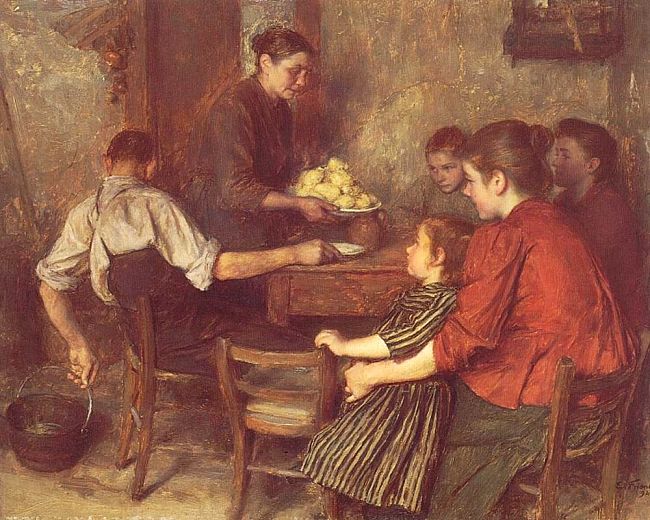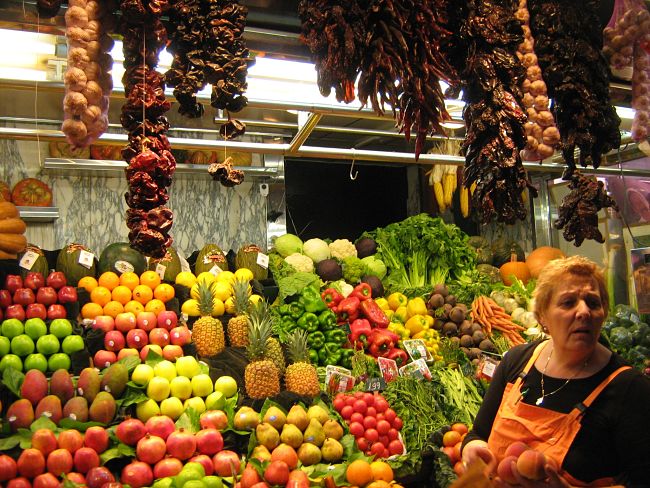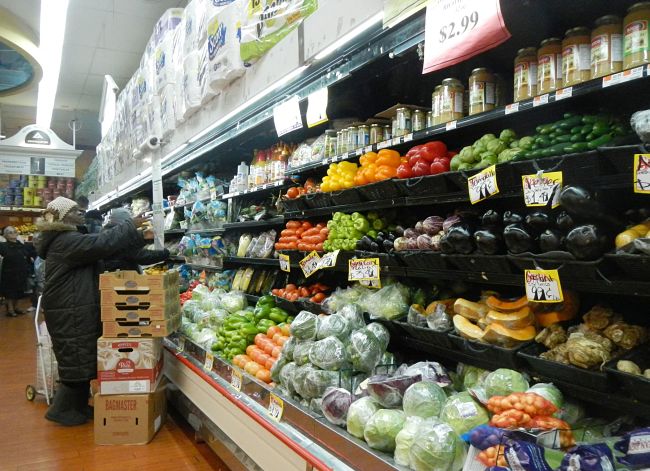Living Frugal Tips to Save Money on Food Bills and Grocery Bills
Times are tough and they are likely to get a lot tougher. The amount of money you spend on food, especially groceries can be a large proportion of your income (10-40%). You can save a lot of this by becoming smarter about what you buy, when, where and why.
You need to do some reverse psychology on yourself to limit your spending sprees or occasional flutters on non-essential items.
You need to do some reverse psychology on the strategies applied by the stores where you buy your groceries.
There are millions of signs saying 'Save', but they don't really want you to save your money, they want you to spend, spend, spend. The 'Save' is merely a sales gimmick - you don't end up with more money left in your pocket or purse.
The stores spend millions on major research projected focused on extracting your money from you as efficiently as possible. You need to shop smarter to counteract this.
The entire layout of the store and the position of the items on the shelves are designed to make you buy more and spend more, often on things you did not really want. The classic example is generic brands. While they are cheaper they may be of inferior quality and have a shorter shelf life.
The stores promote them and put them in prominent places on the shelves - not to save you money, but to make more money for the store because of the higher profit margins on these goods. Similarly the 'Buy 5' or 'Buy 3' deals are really designed to extract more money out of you, for marginal benefits. You spend more buying bulk items that you waste or don't really need.
This article provides the best tips for frugal living when buying groceries to really save you money.

Summary of Tips for Fugal Grocery Shopping
Grocery Shopping - Things to Do
- Do buy generic brands, but check on quality, discounted name brands are best
- Do compare prices using data on 'per lb' or 'per kg'
- Do get organized
- Do use meal plans
- Do make a shopping list and stick to it
- Do plan ahead
Grocery Shopping - Things NOT to Do
- Don't engage in impulse shopping
- Don't shop when you're hungry
- Don't but food just because its discounted
- Don't buy food not on your list
- Don't buy junk food
- Don't buy name brands out of loyalty
- Don't shop on credit
Detailed Frugal Shopping Tips
Buy generic brands - But be Careful
Generic brands are much cheaper, but it pays to check the size ad weight of the goods in the packet. Sometimes the item may be cheaper because there is less of it in the packet. Make sure the item is not of inferior quality. Check on the nearby shelves for discounts on name brand. You may have to check the top and bottom shelves.
Always Compare Prices Using Cost per weight or Number of Items per Pack (unit-pricing information)
Most supermarkets have detailed information on their price labels that provides these details. For example one label may say "$5.10 per pound". The size of the packets and the amounts they contain can vary considerably. Watch out because many of the so-called bargains may be for smaller amounts or smaller packs of various items. Many goods such as chocolates tend to reduce in size while the price remains the same. The new smaller packs may be pushed as discounts, but the price may be less because there is less in the packets.
Be Familiar with the Prices
You can't know whether the price offered is a genuine discount if you don't know the usual price for the items. Just because it's listed as a sale or discount doesn't mean it's a bargain.
Buy in Bulk - But Beware of Overspending and Gluttony
Buying in bulk with your friends, and going to bulk warehouses shopping are good ideas, but make sure you only buy essential items and don't get trapped by their 'too good to miss bargains'.
Coupons are Great for Saving Money
Coupons can provide many benefits, but make sure you still to the essential items. Spending money on luxury items just because you have a discount coupon is still a waste of money.
Plan your Meals Ahead of Time and only Shop Once or Twice a Week
Make a shopping list and then shop to only buy the ingredients for them. The more often you visit the stores the more money you will waste on non-essential things. Try to limit your shopping visits to one or two a week.
Don't Go Shopping When You are Hungry
Eat before you shop. Research studies have shown that hungry people spend more money, not only because they buy snacks, but because they buy more thing from the shelves.
Be Careful of "Buy One Get One Free" and Multiple Item Discounts.
Think about it. Why are the stores offering these discounts. They want to tap into the 'buy in bulk' mentality and convince you that by buying more you will save more. These purchases are only good value if they are for things that you use regularly and can be put in storage. Buying bulk toilet paper when it's on sale makes sense, because they can be stored. But buying 10 bottles of diet soda just because it's on special does not make sense - you will drink a lot more of it and it will have cost you more money than for the singe bottle you were going to buy. Buying perishable goods when offered in multiples is obviously not smart.
Buy Cheaper Cuts of Meat that not been Prepared for Cooking
Any meat that has been marinated, stuffed, boned, wrapped in pastry or prepared for fast cooking could be about twice the price of meat with bone or meat that has not been processed or prepared. Always check the price per kilogram. On the other hand you may be paying a lot for the bones! So do your calculations and look for genuine discounts.
Avoid the 'Temptation' Aisles
The layout of the store and the items have been carefully designed so that the pathway most people take after entering the store has all the "Can't be Missed Bargains" and tempting items such as candies, biscuits, sweets, chocolate bars and similar items. Take another route through the store and only go into the aisles that have the items on your list.
Be aware of the Supermarket Tricks for Item Placements on the Shelves
Always look on the top and bottom shelves as these will often contain discounts for name brand goods that may be better deals than the generic brands on the middle shelves.
Sign up for Customer Loyalty Programs
Many larger grocery chains have a customer loyalty programs offering discounts for regular and loyal customers. Sign up to take advantage of “member’s only” pricing and other deals, but always check the prices and genuine. Loyalty can wane if another store offers lower prices.
Plan you Meals for the Week in Advance and Make a List of Exactly what you Need
The more times you go to a store the greater the risk that you will purchase items you don't really need. Always make a grocery list and stick to it when you go shopping. If you go to the store with only a vague idea or what you are going to cook you will invariably buy stuff you already have in the cupboard or things you don't need.
Take a calculator and keep a running tab of the items as you collect them in the shopping trolley (there are great apps for this).
This is the best way to shop to a budget. If you have a fixed amount which you want to spend then use this method to keep your purchases within budget. If you appear to be exceeding your budget it is time to put some things back on the shelves. It's tough but necessary to keep within your limits.
Buy only the Minimum Amount you Need
There is so much food wasted. Don't buy excess as it will only go to waste. If you need two carrots, don't buy a bag of 20 unless you have plan for them. Buying in bulk can be a false economy if much goes to waste.
Look for Manager’s Specials in the Meat Department
Shop late in the day when many shops will offer discounts on perishable goods. Meat and many other products have a “sell by” date and as that date approaches the goods may be offered at a large discount. Of course you should check that the meat is OK and will be used that day or the next. Don't buy goods that are past or very close to their 'use by dates'.
Carefully Watch the Prices as they are Scanned
Grocery stores often incorrectly ringing up sale items because the discount prices have not been entered into their computers. Staff may not correctly identify fresh fruit items and you may be charged for the dearest variety of apples for example, when you chose a cheap one.
Buy Items you can Store when they are Cheap, Not When You Need Them, Buy Long-lived Items in Bulk
Always buy in bulk and stock up on essential items when they are on sale at genuine discounts. But stick to a small list of these items such as toilet paper, canned tomatoes. Rice, dried beans, cooking oil and many other items can be bought in bulk at greatly discounted prices (buy in large quantities when on sale).
Shop On Non-Peak Days
Find out what days of the month or week are busiest for shopping. Paydays, government allowance days (retirement checks, family allowance), holiday long weekends, Fridays and Saturdays are likely to be the busy times. The first days of the week are likely to be quieter - Mondays, Tuesdays and Wednesdays. Shops like to make a 'killing' and charge average prices on busy days. Many stores will offer discounts on slow days to meet their daily targets. Shopping when its quite also avoids the 'feeding frenzy' mentality that can encourage you to overspend.
Be Careful with Expiry Dates and Positioning on the Shelves
Stores will position the items soonest to expire to the front of the display or shelf and place the items with longer life at the back. This is great for them as they get rid of stuff before it expires. But its is bad for you the customer as the goods may go bad or stale before you have a chance to use them. Choose 'fresh' items with the longest expiry dates so you have more time to consume it (and less chance of waste). Always check the expiry dates.
Keep Your Pantry, Cupboards and Fridge Well Organized
If everything is disorganized and hard to find it increases the risk that you will buy something that you already have. Check use by dates and use the items that are close to the expiry dates. A lot of money is wasted due to disorganization and having to dispose of things.

